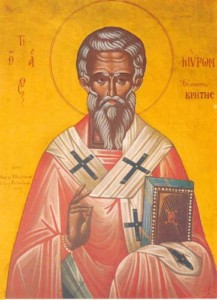Our Holy Father Myron, Bishop of Crete
(Commemorated 8 August)

In 250 AD, amidst the stench and darkness of idolatry, a sweet smelling aroma emerged on the island of Crete. It was St Myron, who was born into an agricultural family in the village of Rafkos (near Knossos). His parents were devout and he learnt from a young age to have faith in God. St Myron distinguished himself in charity and compassion and he used to say that wherever there are poor, greed had previously been there.
He married early and cultivated both the land and all the virtues. Every year he set apart some of his grain for the poor, and every year by the grace of God his yield would increase by the amount he gave. On one occasion thieves burst in upon his threshing floor and stole the sacks of grain, one thief lifting a sack onto the shoulder of another. The saint noticed that there was no one to help the last thief load a sack, so he assisted by lifting and placing it on the thief’s shoulder. Freely he received, and freely he gave.
As the saint performed many wonders the locals requested that St Myron join the priesthood. After his wife prematurely died, he accepted and gave himself to an ascetic life of prayer, the study of the scriptures, and charity.
When the persecutions against Christianity eventually ended, he started preaching openly teaching by word and deed. When the Bishop of Crete died, all the people turned to him, and although he was already 70 years old and wishing to continue a quiet ascetic life, he put the needs of the Church before his own. He accepted the office of Bishop of Gortyn, shining forth as a wonder worker bringing many to the faith. He also supported the First Ecumenical Council by sending representatives to attend on his behalf.
He eventually retired to a cave for solitude and continued to serve in a small church nearby, sleeping peacefully at the age of one hundred on August 8, 350 AD. He was buried under the church where he served, which today is one of the longest serving churches in all of Greece.
One can still smell the sweet aroma of myrrh and witness the fountain of miracles which continue to this day in the village which now honourably bears his name, “Agios Myronas”.
Source: Lychnos August–September 2020
